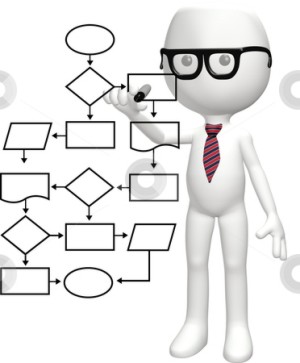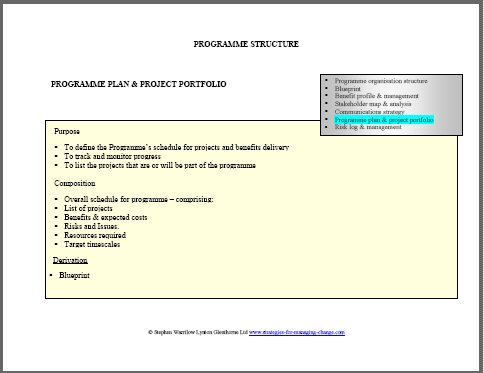|
Programme planThe schedule of projects to deliver the benefits of your change programme
It provides the basis for tracking the impact of each project on the Programme’s overall goals, benefits, risks and costs.
It also enables the Programme Manager to monitor the dynamics of the inter-relationships between each project and to act when a delay in any one project might jeopardise the work of others.
Developing and maintaining the Programme Plan and Project Portfolio requires the ongoing coordination of all the Project Plans. The focus for programme planning is on the interdependencies between the projects and any dependencies on external factors outside the control of the programme. It is a 'living' entity, providing a definitive and up-to-date picture of the programme from which reports can be drawn to analyse and publicise the current status of the programme.
Grouping projectsIf you have a large number of projects, it is useful to group the projects around distinct step changes in organisational capability such as increasing competencies or improving the organisation's infrastructure.
Projects can be grouped by:
The objectives are:
Shared resourcesShared resources also represent a set of dependencies between projects and needs to be coordinated at the programme level. The programme planning process will identify a number of resources that need to be shared between projects. Typical examples are:
Dependency networkThe network of dependencies between projects needs to documented showing:
The purpose of this is to enable the Programme Manager to schedule the projects and to analyse the impact of any potential slippages and to assess the level of "wiggle room" before a slippage by one project in turn delays another.
Project definitionProject definition including objectives, scope, deliverables and/or outcomes, any exclusions, constraints, and interfaces. For each of the projects within the Portfolio, the following should be identified:
Project ClosureThe process of project closure is an integral aspect of the Programme Plan and Project Portfolio and [supported by the Programme Manager] the purpose is to identify any lessons learned and to effect the formal hand-over of the deliverable or outcome. The Post Project Reviews should be scheduled to fit into the Programme Benefit Review process.
Additional resourcesProject management principles - 10 ways to make a project fail Project management methodologies - 8 ways to succeed Project management skills - 8 key factors
|


 The
The






